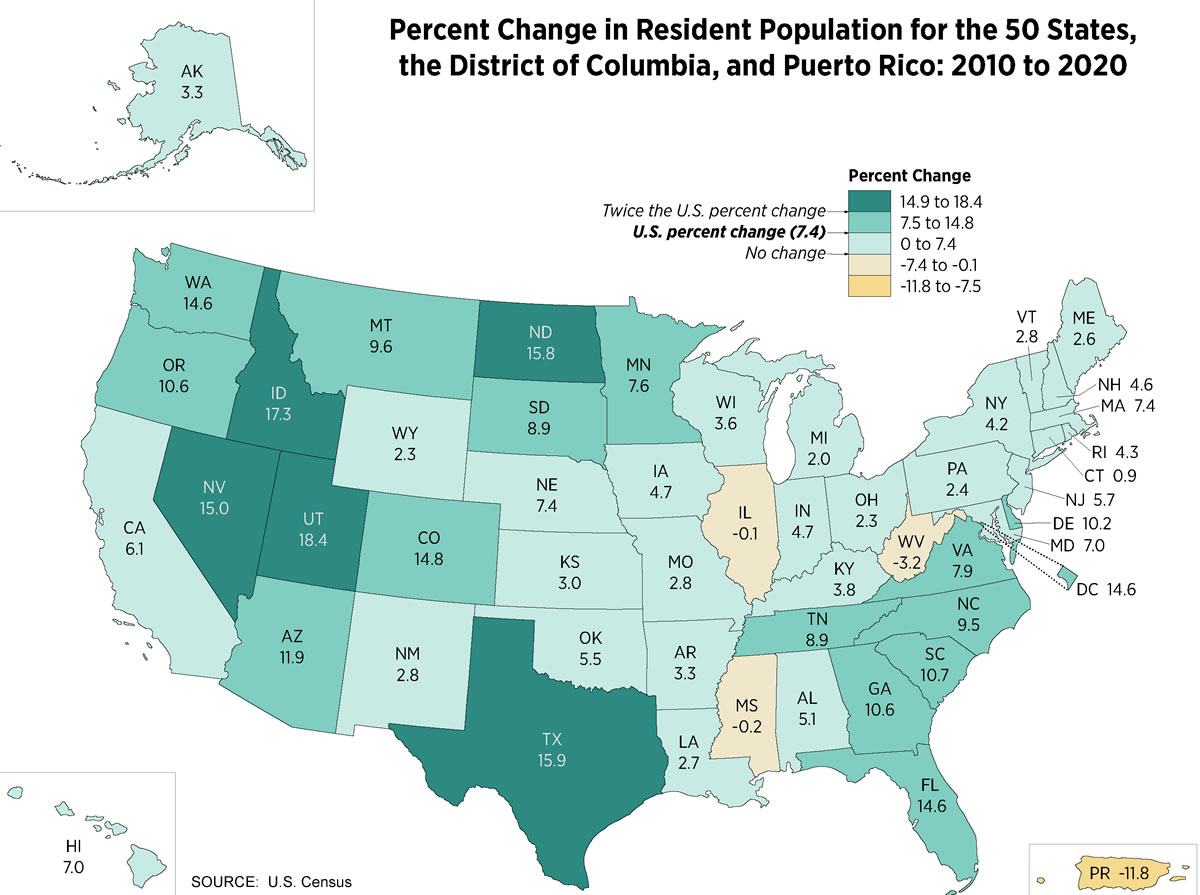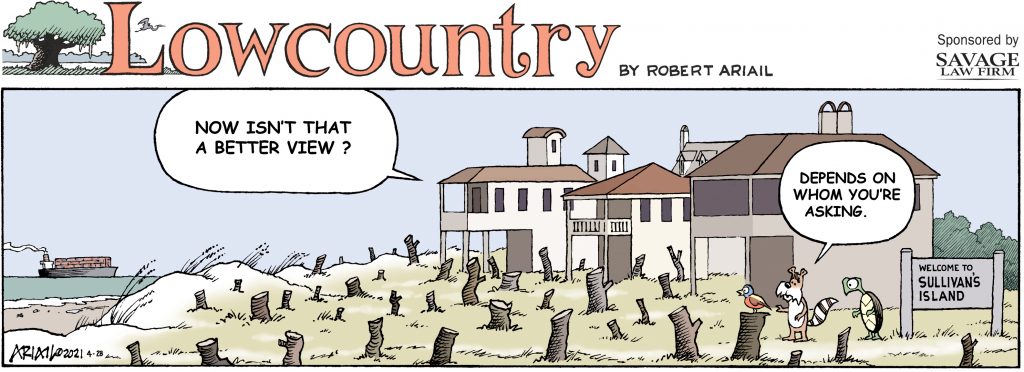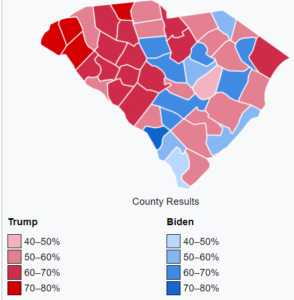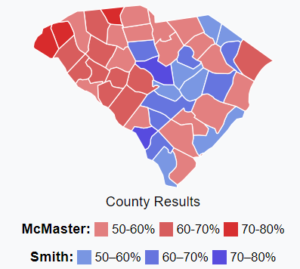STATEHOUSE REPORT | ISSUE 20.18 | APRIL 30, 2021
BIG STORY: State’s growth might lead to extra seat by 2032
NEWS BRIEFS: Conservationists applaud regulators’ decision on rooftop solar
LOWCOUNTRY, Ariail: The new Battle of Sullivan’s island
COMMENTARY, Brack: Gubernatorial race kicks into gear early
SPOTLIGHT: Charter Communication
FEEDBACK: Keep your masks on, more
MYSTERY PHOTO: Sin
State’s growth might lead to extra seat by 2032

News analysis by Andy Brack | New top-line numbers from the 2020 U.S. Census show South Carolina picked up almost a half million new residents from 10 years earlier, but its 10.7 percent growth wasn’t enough to lead to an additional congressional district.
If the state’s higher-than-average growth continues, however, there’s a slight chance it could add an eighth congressional seat during constitutionally mandated redistricting in 2031 after the 2030 census, according to a Statehouse Report analysis.
Nationally, the U.S. population grew to 331.4 million in 2020, up 7.4 percent or 22.7 million people from 2010, according to the Census.
Based on the 2020 census, six states will gain extra seats because of population redistribution and growth — two for Texas and one each for Colorado, Florida, Montana, North Carolina and Oregon. Seven states lost seats — California, Illinois, Michigan, New York, Ohio, Pennsylvania and West Virginia. New York made headlines for losing a seat by coming up 89 people short.
In 2010, South Carolina gained a seventh congressional seat. Members of the General Assembly then redrew maps to carve a seat (SC-7) that stretches from Florence to the Grand Strand and redrew lines to restore a seat (SC-1) centered on Charleston and Beaufort counties.
According to the 2020 results released this week, South Carolina maintained its seventh congressional seat through a complicated formula that produces priority ratings of population for each seat in the U.S. House. South Carolina had enough people to come in 421 out of 435 House seats in the priority rating system to keep the seventh seat. That ranking also means 14 seats have lower ratings and associated populations.
Minnesota, which scored 435th in the 2020 census rating to keep a seat, has a population of 5.7 million, which is about 600,000 more people in South Carolina.
If South Carolina continues to grow at a higher pace than the national average — as most Sunbelt states do — there’s a chance it could pick up another seat in 2031. To do so, it would have to add at least another 600,000 people, but probably more like 700,000, over the next 10 years. But keep in mind, the 2020 census shows several states — Utah, Idaho, Nevada, Texas, North Dakota and Florida — had higher growth rates than South Carolina.
- Have a comment? Send to: feedback@statehousereport.com.
Conservationists applaud PSC decision on rooftop solar

Staff reports | The state Public Service Commission (PSC) on Wednesday unanimously rejected a rate plan by Dominion Energy that conservationists said would have made it too costly for homeowners to add rooftop solar panels.
Instead, regulators adopted an alternative pricing plan that’s being hailed as a win for energy independence and a victory for the rooftop solar industry. (You can find the Wednesday meeting here.)
“Today’s ruling will allow this important industry to continue to grow and provide ratepayers the freedom to reduce energy bills and emissions,” said John Tynan, executive director of the Conservation Voters of South Carolina. “This ruling also demonstrates that the PSC is faithfully implementing the Energy Freedom Act, is standing up for the best interests of all customers, and is not afraid to push back on egregious proposals by the utility monopolies. In short, today is a bright day for solar in South Carolina.”
Tynan said ratepayers wanted a fair rooftop solar plan.
“This ruling shows a broader trend for energy decisions in South Carolina — that there’s a new PSC in town. We finally have a Public Service Commission that will listen to experts, thoughtfully consider public input, and encourage robust engagement from stakeholders as the Commission helps to chart the path forward for South Carolina’s energy future — even when it means pushing back against the utility monopolies.”
Frank Knapp, president of the S.C. Small Business Chamber of Commerce added in a statement, “Their ruling is also clear evidence that the Commission is no longer in the back pocket of the utility industry.”
In other recent news:
![]() State Senate approves 2021-22 budget. South Carolina senators on Thursday approved the state’s budget for next fiscal year but spent more time talking about social issues important to conservative members. Previous coverage: Debate to start on $11.4 billion budget.
State Senate approves 2021-22 budget. South Carolina senators on Thursday approved the state’s budget for next fiscal year but spent more time talking about social issues important to conservative members. Previous coverage: Debate to start on $11.4 billion budget.
Pence tests waters in Columbia. Former Vice President Mike Pence put down a marker for a potential run in the 2024 election before an audience in Columbia Thursday during his first speech since leaving office. He touted accomplishments of the Trump administration.
S.C. Senate ready to debate open carry of guns. South Carolina senators took several steps Thursday to bring to a vote a bill that would allow licensed people to openly carry pistols and not hide them under a jacket.
SCHA to hold 2021 Hope Tour. The S.C. Hospital Association announced this week it will visit every member hospital in the state May 3 to May 13 to celebrate and honor health care workers who have been fighting COVID-19 for more than a year. “Our health care heroes responded with resilience as they ramped up widespread testing operations and treated thousands of COVID-19 patients in need,” said Lara Hewitt, SCHA vice president of workforce and member management. “Now, more than a year later, they are still providing high-quality care for patients while also leading the vaccination campaign that can finally end the pandemic.”.
Scott’s national rebuttal: U.S. isn’t racist country. U.S. Sen. Tim Scott took the national stage Wednesday to make the Republican response to Democratic President Joe Biden’s speech to a joint session of Congress. The Senate’s only Black Republican, Scott said, “America is not a racist country” and said the economy under previous Republican President Donald Trump boomed, especially for Black and brown people. Read the full transcript here.
NextEra withdraws Santee Cooper bid. NextEra Energy has withdrawn its offer to purchase Santee Cooper, a move that effectively ends the years-long debate over whether to sell South Carolina’s embattled electric and water utility, according to findings from The Post and Courier. This means the public utility will likely remain in state hands for the time being.
S.C. launches statewide effort against human trafficking. The South Carolina Human Trafficking Task Force on Wednesday announced the launch of the South Carolina Highway Heroes Campaign to help fight human trafficking in the Palmetto State. The campaign offers a free Truckers Against Trafficking online training to the state’s more than 100,000 commercially licensed drivers in the state.
S.C. House passes bill reducing drug crime penalties. In a 62-45 vote, the House approved Wednesday a bill that would eliminate mandatory minimum sentences for drug offenses, reduce non-parole-eligible sentences and increase the drug amounts necessary for charges. The vote came hours after Attorney General Alan Wilson expressed his opposition to the bill. The bill will likely be on hold until the Senate reconvenes in 2022.
Second version of anti-trans sports ban fails in S.C. A second version of the ‘Save Women’s Sports Act’, H. 4153, failed in the House Judiciary Committee.
The new Battle of Sullivan’s island

Here’s a new cartoon by Robert Ariail that first was published in our sister newspaper, the Charleston City Paper. It highlights a battle on Sullivan’s Island, where a town election will be held May 5. A big focus of the election is a plan passed narrowly by council to cut down part of a maritime forest. Tuesday’s vote essentially is a referendum on that plan. Love the cartoon? Hate it? What do you think: feedback@statehousereport.com.
Gubernatorial race kicks into gear early

By Andy Brack, editor and publisher | And just as predictable as sunrise, the race to be the next governor of South Carolina is on.
 Former Congressman Joe Cunningham of Charleston, a one-term Democrat who lost a bid for reelection in November, came out of the gate quickly this week to try to nab the seat occupied by GOP Gov. Henry McMaster.
Former Congressman Joe Cunningham of Charleston, a one-term Democrat who lost a bid for reelection in November, came out of the gate quickly this week to try to nab the seat occupied by GOP Gov. Henry McMaster.
“The challenges we face in this state aren’t because of our people, they’re because of career politicians like Henry McMaster who have been in politics longer than I’ve been alive,” Cunningham told Statehouse Report. “And after 20 years of one-party rule and one way of thinking, it’s time for something different — something new.”
Cunningham, 38, was born in 1982 at which time McMaster was serving as the state’s U.S. Attorney after being appointed by Ronald Reagan, the nation’s 40th president. McMaster went on to run unsuccessfully for U.S. Senate and lieutenant governor before being elected attorney general twice statewide. He later lost a 2010 bid for governor, followed by 2014 win for lieutenant governor. McMaster became governor in 2017 after Gov. Nikki Haley became United Nations ambassador in the Trump administration. McMaster then won a full term as governor in 2018 with an eight-point victory over Democratic nominee James Smith of Columbia.
So now comes Cunningham, who announced his bid for a general election 18 months away. First, though, he has to win the Democratic nomination. But by coming out so early — and with strong initial fundraising — Cunningham may just scare away other Democratic candidates in what is seen as a tough race for a Democrat to win anyway. The last Democratic governor was elected in 1998 and currently there are no Democrats in statewide elected roles.
But Cunningham’s early numbers are impressive, as the candidate related: “We’re building a campaign unlike anything this state has ever seen. We raised almost half a million dollars from grassroots supporters in the first 48 hours of this campaign because people are yearning for new leadership and that’s exactly what I represent.”

Still, it won’t be easy, particularly if you look at the solid red band of Republican counties across the top half of the Palmetto State. Not only did Donald Trump carry those counties convincingly — often with more than 70 percent of the vote in 2020 — but McMaster, who will tell you in a skinny minute that he was the first statewide official to endorse Trump in 2016, has spent years cultivating Upstate voters as his base through a blend of wily conservative politics and appealing to Christian voters.
But McMaster may have some work to do to keep his supporters in line. Scuttlebutt is that Greenville businessman John Warren is eyeing another run for governor by campaigning to the right of McMaster. And it could work. In 2018, McMaster won a five-way primary by nabbing 42 percent of the vote, but was forced into a runoff with Warren, who picked up an impressive 46 percent of the vote in the runoff. Coming that close might tempt him to give it another try as many Republicans would note McMaster, a familiar face with a thick grandfatherly drawl, is no Donald Trump.

One pathway for Cunningham to succeed is to draw Warren as a challenger. He could make the case that he was a safer candidate than someone untested like Warren. But such a race would likely have all of the predictable catcalls and worn themes of right-wing conservatism versus left-wing liberalism.
If Cunningham has McMaster as an opponent, the race would be more nuanced, a battle versus old-school and the upstart, of age and experience versus fresh ideas. But wasn’t that the kind of campaign that Smith tried in 2018?
So we’ll see what time and money bring for 2022. As Cunningham notes, “We’ve defied the odds before and we’re going to do it again.”
- Have a comment? Send to: feedback@statehousereport.com.
Charter Communication
 The public spiritedness of our underwriters allows us to bring Statehouse Report to you at no cost. Today, we’re happy to shine the spotlight on Charter Communications, the nation’s fastest-growing TV, internet and voice company. Committed to integrating the highest quality service with superior entertainment and communications products, Charter is at the intersection of technology and entertainment, facilitating essential communications that connect 24 million residential and business customers in 41 states, including South Carolina. In addition to being committed to giving back to the communities we serve, the bedrock of our business strategy is to serve our customers and exceed their expectations.
The public spiritedness of our underwriters allows us to bring Statehouse Report to you at no cost. Today, we’re happy to shine the spotlight on Charter Communications, the nation’s fastest-growing TV, internet and voice company. Committed to integrating the highest quality service with superior entertainment and communications products, Charter is at the intersection of technology and entertainment, facilitating essential communications that connect 24 million residential and business customers in 41 states, including South Carolina. In addition to being committed to giving back to the communities we serve, the bedrock of our business strategy is to serve our customers and exceed their expectations.
“We, at our core, are a service organization,” President and CEO Tom Rutledge says. “And every product we sell has a huge service component.”
- To learn more, visit Charter’s South Carolina services online.
Keep your masks on
To the editor:
![]() Most adults can separate fact from fantasy. The facts for public health are driven by data. The S.C. COVID-19 infection rate is below one saying the daily number of cases are expected to decline. But not cease.
Most adults can separate fact from fantasy. The facts for public health are driven by data. The S.C. COVID-19 infection rate is below one saying the daily number of cases are expected to decline. But not cease.
Imperial Gov. Henry McMaster says government-mandated mask-wearing and other COVID-19 restrictions must end across South Carolina. Do “whatever’s necessary” to put a stop to masking. In this fantasy, no and low case counts have the same meaning.
If McMaster means that retailers or employers on their own cannot adopt or enforce masking to keep people safe, then every person entering an indoor place is at risk. Many of us understand the CDC guidance is for indoor risks. Inside any room is the best place to get infected. That’s the reason why CDC says a mask is not needed outside. Unless it is crowded.
Choose to keep your masks on, no matter what the McMaster epidemiological fantasy is this time. Guess Biden is not a legitimate president either.
— Fred Palm, Edisto Island
Brack on target
To the editor:
On the dumbing down of American political discourse: You always give me hope. Thank you.
— Mike Kirk, Santee
At opposite poles
To the editor:
We’re at opposite political poles, you with those whose only objective is political control, I with those who want the best for our nation. This fact is demonstrated by your labeling the bright people the ones at NPR and PBS, and denigrating Jim Jordan and all at FoxNews.
I wonder if you have ever heard Mark Levin, Trey Gowdy, Tammy Bruce or Tucker Carlson, all true intellectuals. If you consider the television and print media people the bright ones, you’re as leftward and unintelligent as most of them are.
— Bruce Tennant, Greenwood
Send us your thoughts
We love hearing from our readers and encourage you to share your opinions. But to be published, you’ve got to provide us with contact information so we can verify your letters. Letters to the editor are published weekly. We reserve the right to edit for length and clarity. Comments are limited to 250 words or less. Please include your name and contact information.
-
- Send your letters or comments to: feedback@statehousereport.com
Sin

You’ve probably seen signs like this along a highway or two. Can you identify where this one is? (Yes, it might be tough and probably isn’t going to show up on your Google image search.) Send your guess to feedback@statehousereport.com — and remember to include your name, home city and contact information.
 Last week’s mystery, “Not the Citadel,” drew a bunch of correct guesses from readers. The photo showed what’s known as the Beaufort Arsenal, which is the current location of the Beaufort History Museum.
Last week’s mystery, “Not the Citadel,” drew a bunch of correct guesses from readers. The photo showed what’s known as the Beaufort Arsenal, which is the current location of the Beaufort History Museum.
Congratulations to these eagle-eyed readers who correctly identified the building: Jay Altman and Elizabeth Jones, both of Columbia; Frank Bouknight of Summerville; Jacie Godfrey and Barry Wingard, both of Florence; George Graf of Palmyra, Va.; Will Bradley of Las Vegas, Nevada; Allan Peel of San Antonio, Texas; Elaine Huff-Lowe of Inman; Tray Hunter of Bluffton; Kevin Mertens of Greenville; and Pat Cooke.
Graf provided some more context: “The Beaufort Arsenal Museum opens a fascinating window on the past. It offers insight into the rich history of the Lowcountry. Historic artifacts on display represent Native American settlements, the earliest 16th-century Spanish settlement, Union occupation during the Civil War and 20th-century phosphate mining, truck farming, fishing, shrimping and oystering industries. Construction of the Beaufort Arsenal started in 1795 and ended by 1799. The building had deteriorated substantially by 1852, when the Beaufort Volunteer Artillery Company rebuilt the complex.”
Send us a mystery. If you have a photo that you believe will stump readers, send it along (but make sure to tell us what it is because it may stump us too!) Send to: feedback@statehousereport.com and mark it as a photo submission. Thanks.
ORDER NOW: Copies are in Lowcountry-area bookstores now, but if you can’t swing by, you can order a copy online today.
ABOUT STATEHOUSE REPORT
Statehouse Report, founded in 2001 as a weekly legislative forecast that informs readers about what is going to happen in South Carolina politics and policy, is provided to you at no charge every Friday.
Meet our team
- Editor and publisher: Andy Brack, 843.670.3996
- Special correspondent: Lindsay Street
Donate today
We’re proud to offer Statehouse Report for free. For more than a dozen years, we’ve been the go-to place for insightful independent policy and political news and views in the Palmetto State. And we love it as much as you do.
But now, we can use your help. If you’ve been thinking of contributing to Statehouse Report over the years, now would be a great time to contribute as we deal with the crisis. In advance, thank you.
Buy the book
Now you can get a copy of editor and publisher Andy Brack’s We Can Do Better, South Carolina! ($14.99) as a paperback or as a Kindle book ($7.99). . The book of essays offers incisive commentaries by editor and publisher Andy Brack on the American South, the common good, vexing problems for the Palmetto State and interesting South Carolina leaders.
More
- Mailing address: Send inquiries by mail to: P.O. Box 21942, Charleston, SC 29413
- Subscriptions are free: Click to subscribe.
- We hope you’ll keep receiving the great news and information from Statehouse Report, but if you need to unsubscribe, go to the bottom of the weekly email issue and follow the instructions.
- Read our sister publications: Charleston City Paper (every Wednesday) | Charleston Currents (every Monday).
- © 2021, Statehouse Report, a publication of City Paper Publishing, LLC. All rights reserved.



